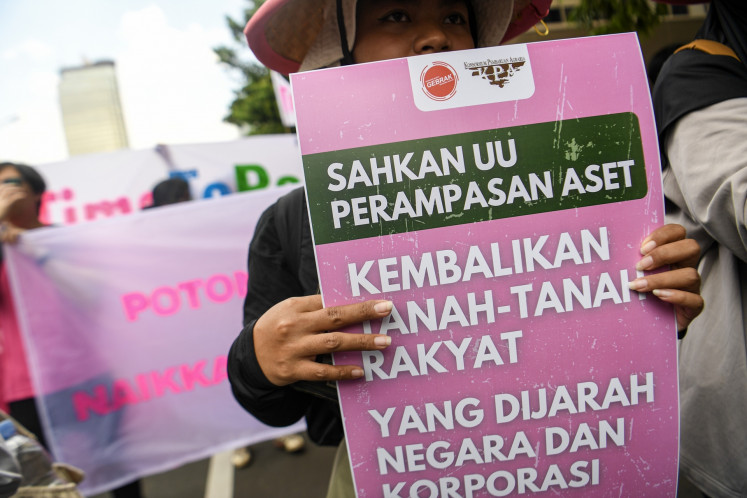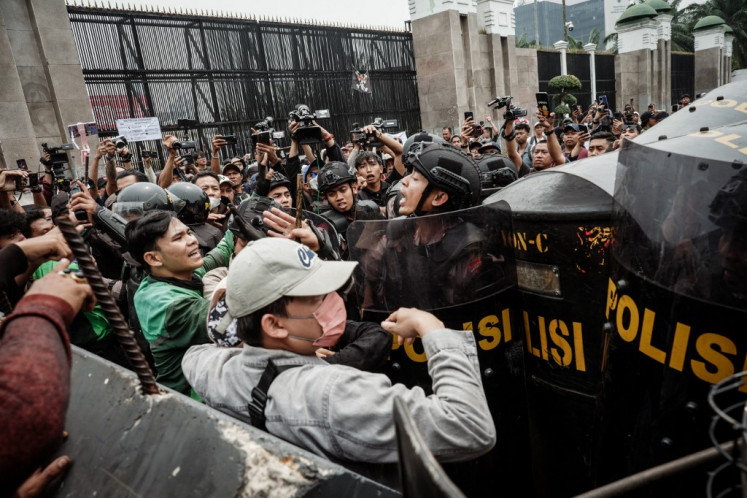Popular Reads
Top Results
Can't find what you're looking for?
View all search resultsPopular Reads
Top Results
Can't find what you're looking for?
View all search resultsGovt to ease foreign worker licensing
The government will simplify bureaucratic procedures in the documentation of foreign workers and end overlapping among state institutions through an online licensing system
Change text size
Gift Premium Articles
to Anyone
T
he government will simplify bureaucratic procedures in the documentation of foreign workers and end overlapping among state institutions through an online licensing system.
The simplified procedure is expected to ease the recruitment of the particular foreign workers the country needs most.
President Joko “Jokowi” Widodo said on Tuesday that certain qualified foreign workers were needed to support investment. He added, however, that procedures for foreign-worker recruitment were complicated.
“I’ve received a lot of complaints that foreign-worker licensing is complicated,” Jokowi said during a Cabinet meeting at the Presidential Palace in Jakarta.
Under prevailing regulations, a company needs to produce at least 10 documents to employ a foreign worker. These are the foreign manpower employment plan (RPTKA), recommendation of foreign manpower employment (IMTA), temporary stay permit visa (VITAS), temporary stay permit (KITAS), police report certificate (STM), residency certificate (SKTT), temporary alien resident information letter (SKKPS), report of presence (Lakeb) and a multiple exit re-entry permit.
Jokowi ordered his ministers to make the licensing and documentation simpler by adopting an online system and integrating the procedures at the Manpower Ministry and the Directorate General of Immigration at the Law and Human Rights Ministry.
“I want it simpler [...] I want it to run on an online basis and see integrated procedures between the Manpower Ministry and the Directorate General of Immigration,” he said.
The President criticized the overlapping of supervision work by personnel from the Manpower Ministry and the immigration office. He said such monitoring, which occasionally involves raids, could alienate businesses.
“I get reports that employers are disturbed and troubled because of the sweeps. The Manpower Ministry operates on its own while the immigration office also works on its own. The control and supervision must be consolidated,” he said.
Coordinating Economic Minister Darmin Nasution said several licenses, such as the RPTKA and IMTA, would be dropped. He also said that licensing procedures for foreign workers would be handled only by the Manpower Ministry.
“We want to simplify the procedures,” he said, adding that companies actually did not want to employ foreign workers unless they were urgently needed because foreign workers were more highly paid.
Darmin said Indonesia was in need of more foreign workers especially for education and vocational training. Previously, the government had signed memorandums of understanding (MoUs) with countries such as Germany and Switzerland for vocational training.
“Many vocational high schools, polytechnics and training institutions lack trainers. As we need to train these trainers, we have to invite foreign facilitators,” he said.
Research, Technology and Higher Education Minister Mohamad Nasir said Indonesia planned to facilitate foreign universities in opening campuses here. Some famous universities such as Cambridge, and Imperial College in the United Kingdom and Australia’s Monash are reportedly interested in doing so.
However, currently it was difficult for educational institutions to employ foreign lecturers.
Manpower Minister Hanif Dhakiri said other relevant ministries would also loosen the requirements for foreigners to work in Indonesia.
“Some requirements will be eased, for example in the oil and gas industry, a company can only employ foreign workers between 35 and 55 years old. It is irrelevant right now because there are a lot of skilled workers below 35 years old,” he said.
Hanid added currently there were 126,000 foreign workers in Indonesia. China is the biggest supplier, followed by Japan, Singapore, Malaysia and the United States.










